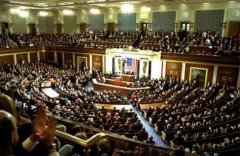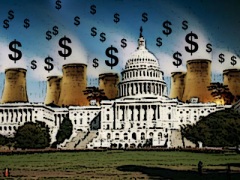As Predicted, Democrats Blame Tea Party for Downgrade
August 8, 2011
Meanwhile, Senator Lindsey Graham said something diametrically opposite that does reflect reality: “The tea party hasn’t destroyed Washington. Washington was destroyed before the tea party got here.”
by Ben Wolfgang
Washington Post
August 8, 2011
While continuing to cast doubt on the credibility of Standard & Poor’s, several Democrats on Sunday said there is an even greater culprit in the downgrade of the nation’s credit rating: the tea party.
“I believe this is, without question, the tea party downgrade,” Sen. John F. Kerry, Massachusetts Democrat, said on NBC’s “Meet the Press” on Sunday, a day that also saw mounting anxieties in world markets over the downgrade among myriad other economic woes worldwide. Some of the world’s top financial ministers issued a joint statement Sunday night committing themselves to preserve the stability of financial markets and their economies.
David Axelrod, a former senior adviser to President Obama, used the exact same phrase in dubbing the credit rating drop the “tea party downgrade,” as Democrats tried to position themselves as reasonable, pragmatic leaders and conservative Republicans as irresponsible ideologues who caused the downgrade by refusing to accept any new taxes.
That’s exactly the kind of blame game that led Standard & Poor’s, one of three key credit-ratings agencies, to strip the U.S. federal government of its AAA status Friday night and reducing it to AA+ for the first time in the nation’s history.
“Congress and the administration are jointly responsible for the conduct of fiscal policy. So, this is not really about either political party,” David Beers, the head of S&P’s government debt-rating unit, said during an appearance on “Fox News Sunday.”
In justifying its actions, S&P cited the political gridlock that continues to paralyze Washington. Although Democrats and Republicans eventually came together last week and crafted a compromise bill to raise the nation’s debt ceiling, S&P decided it wasn’t enough to save the nation’s AAA status, a rating still held by France, Sweden and other countries, and businesses such as Coca-Cola Co. and Microsoft Corp.
“Even with the agreement of Congress and the administration this past week … the underlying debt burden of the U.S. government is rising and will continue to do so most likely over the next decade,” Mr. Beers said.
Sen. Lindsey Graham, South Carolina Republican, defended the tea party and said that without the movement, trillions of dollars in spending cuts wouldn’t be possible.
“Thank God they’re here,” he said on CBS’ “Face the Nation.”
“This is the first time we’ve ever raised the debt ceiling where we tried to actually reduce spending. That’s a good thing, but we’re woefully short,” he said. “The tea party hasn’t destroyed Washington. Washington was destroyed before the tea party got here. The hope is that the tea party and middle-of-the-road people can find common ground to turn this country around before we become Greece.”
Democrats, who also had harsh words for S&P, said there’s enough blame to go around.
Lawrence H. Summers, former director of Mr. Obama’s National Economic Council, on Sunday called the agency’s track record “terrible.” He referenced S&P’s highly positive ratings for mortgage-backed securities that tanked in 2008, which many blame for the ongoing economic crisis.
Treasury Secretary Timothy F. Geithner, in his first public comments on the credit downgrade, told CNBC that S&P had shown “terrible judgment.”
“They’ve handled themselves very poorly. And they’ve shown a stunning lack of knowledge about the basic U.S. fiscal budget math,” he said.
Democrats weren’t alone in their stinging critiques of S&P. Speaking on CNN’s “State of the Union,” Steve Forbes, former Republican presidential candidate and CEO of Forbes Inc., said the downgrade was “outrageous” and “a political move.”
Read Full Article…



 telephone survey finds that 63% of U.S. voters now favor repeal of the plan passed by congressional Democrats and signed into law by President Obama in March.
telephone survey finds that 63% of U.S. voters now favor repeal of the plan passed by congressional Democrats and signed into law by President Obama in March. Fifty-five percent (55%) say the plan will make the quality of health care in the country worse. Twenty percent (20%) expect it to improve the quality of health care, and 18% think quality will stay about the same.
Fifty-five percent (55%) say the plan will make the quality of health care in the country worse. Twenty percent (20%) expect it to improve the quality of health care, and 18% think quality will stay about the same.